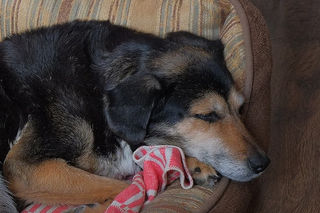You think you feel something at the foot of your bed. You feel something snuggling against your leg. What is going on? Could this REALLY be your beloved pet that has passed? Of course it could! We all have, more than likely, experienced the loss of a close member of the family....your pet. If you are a pet owner, no matter what the pet....a dog, cat, bird or even snakes you develop a love for them that is unconditional. On that bad day you had, they don't care. The day you wrecked you car, you were still greeted with a long, wet lick in the face or when you are sobbing at that sad, sad last episode of Friends, your "best friend" jumps in your lap and gives you THAT SWEET look of "it's going to ok".
So, what happens when we loose them? We grieve and grieve. This I know first hand, as I lost my little dog Holly very unexpectedly and everyday my I think about her. I can barely look at a picture of her without breaking down. But here's the deal. I have seen her and I have felt her. Do pets really have spirits that stay behind? Some do. Listen, sometimes when we see apparitions or ghosts it's because of a tragic event and the person doesn't know they are dead. Or they have to make sure someone completes "their" journey. And sometimes, it's just to help us with the grieving process.
Pets are different. There is only one reason their spirit stays behind. And that's YOU! Our pets entire lives are built around us and being our companion. Nothing makes a pet happier than pleasing their owner. So, guess what? When they die....that doesn't change. And let me tell, thanks goodness it doesn't!
 |
| Me and Holly |
The night Holly died I had gone to the store and I came home and found her dead by the door and I have always thought, if I hadn't gone to the store that night maybe I could have saved her. Was she by the door waiting for me to return? The guilt was and is as real as anything I have ever felt. Holly used to sleep with me so I had her buried right by my bedroom window so that she could still "sleep close" to me. Anyway, after that sad story, I can tell you that I heard Holly many nights walking in the hall like she used to do and I would see her literally running through the house. I think Holly knew how much pain I was in and wanted to make it better...yes, even from the other side. And guess what? EVERY TIME I saw her or heard her I would smile. So, if you think you have lost your "best friend" that always had nothing but unconditional love for you, you haven't. The shadow in hall or the dog toy that suddenly shows up out of know-where....just might be your "best friend" paying you a visit.
Now, I wanted to include an article written by Stanley Coren Ph D., that I just read that has nothing to do with ghosts, or ghost spirits, but it does have to do with death and how when we have more than one pet that the other pet grieves as well. That's right. Your other pet. The one that will stare into the kitchen looking at the dog bowl as if they are seeing something. Maybe they are! But lets not forget them in this process. They grieve as well. And you know, as much as your pet loved you...they loved your other pet to. So, it is no surprise that they would come back to say "hi" to them as well. The article below talks about your pets grief. I thought it was really good and just wanted to include it with this blog.
So, I guess what I am trying to say is...your beloved pet may still be around. So have some treats handy...
Do Dogs Grieve Over the Loss of an Animal Companion?
A poignant study confirms what many owners suspected about pets and grieving.
Posted Nov 10, 2016
Source: John Perry photo — Creative Commons License
I recently visited the home of some friends who have always had Boston Terriers as their companion dogs, usually in pairs, and always in the traditional black and white coloration. Quite often, they also had a cat as a pet, which was usually black-and-white to match the dogs. I always felt that it was Violet's work as an interior decorator that compelled her to have color-coordinated pets. On this visit, I found only one dog in the house. Lou explained that in the course of a few months they had lost one of their Boston Terriers (Lily) and shortly thereafter their cat (Rosie). Lou went on to say, "Now we only have Daisy. She took the loss of Lily and Rosie pretty hard, so we are looking to get a puppy companion for her as soon as possible."
I sat down on the sofa where Violet was sitting with Daisy. She said:
"Daisy was really upset when Lily passed. She kept checking the places where Lily usually took her naps, and when she didn't find her she would whine or whimper. She also got really clingy and demanded a lot of affection from me. Things got better after a month or so but then Rosie, our cat, died. I was surprised to find that Daisy showed the same kinds of behaviors when she couldn't find Rosie. Daisy kept looking for her in her usual spots, began whimpering again, and seemed to want to be close to me. She even stopped eating as enthusiastically as she usually did, as though she had lost part of her appetite."Although Daisy's behavior at the loss of her canine companion was familiar to me, I was a bit surprised to learn she showed signs of grief at the loss of the cat as well. However, a recent study published in the journal Animals attempts to catalog the behaviors of dogs and cats when they suffer the loss of an animal housemate, and what the study found suggests that Daisy's behavior is not atypical. The study was conducted by a team of researchers headed by Jessica Walker of the New Zealand Companion Animal Counsel who collected data pertaining to 159 dogs and 152 cats. The data consisted of questionnaire responses from pet owners in New Zealand and Australia who owned multiple pets at the same time and had lost one within the past five years. The pet owners were asked to recall how the surviving pet responded to the disappearance of their companion.
One of the most common behaviors observed in dogs was to continually check the places where their lost housemate normally napped or rested. This behavior was found in 60 percent of the dogs (regardless of whether the lost companion was a dog or a cat) and 63 percent of the cats. Virtually the same proportion of surviving pets demanded more affection or became clingy and needy (61 percent of dogs and 62 percent of cats). Increases in whining and whimpering was less frequent, occurring 27 percent of the time in dogs. However, increased vocalizing was much more common in cats (43 percent). Roughly one in three dogs and cats reduced the amount of food they ate and the speed in which they ate it (35 percent in dogs and 31 percent in cats). Dogs were more likely to increase the amount of time that they spent sleeping (34 percent), which was less likely in cats (20 percent). The interesting thing is that these are all behaviors one might observe in a young human child experiencing grief and stress because of the loss of a human family member.
article continues after advertisement.
Two aspects of this data surprised me. The first is that the cats seem to show grief-like behaviors to the same extent as the dogs. The second is that the dogs seem to show an equal amount of grief-related behavioral changes when the animal companion they lost was a cat rather than another dog.One particularly interesting finding is that some animal behaviorists believe that the grief response in dogs can be reduced if the animal has a chance to view their deceased companion's body. The idea is that this provides closure: The dog will understand that their companion is no longer alive and is not coming back. In the study, 58 percent of the dogs and 42 percent of the cats got to view the body of their companion. The majority (73 percent) took the time to sniff and investigate their deceased housemate. However, no one reported behavioral differences between the animals that saw, and those that did not see, a dead companion's body. This seems to confirm that dogs act very much like human children younger than four, in that they do not have a concept of death as a final and irrevocable separation. Instead, they simply feel the loss of the presence, friendship, and companionship of their loved one; that loss causes their stress and grief-like behaviors.

Source: Anna Baburkina/Shutterstock


No comments:
Post a Comment